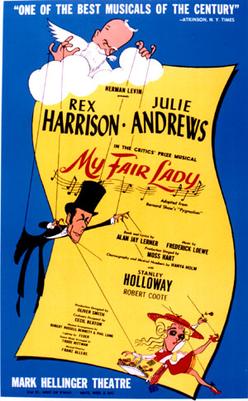
My Fair Lady is a musical with a book and lyrics by Alan Jay Lerner and music by Frederick Loewe. The story, based on the 1938 film adaptation of George Bernard Shaw's 1913 play Pygmalion, concerns Eliza Doolittle, a Cockney flower girl who takes speech lessons from professor Henry Higgins, a phonetician, so that she may pass as a lady. Despite his cynical nature and difficulty understanding women, Higgins grows attached to her.
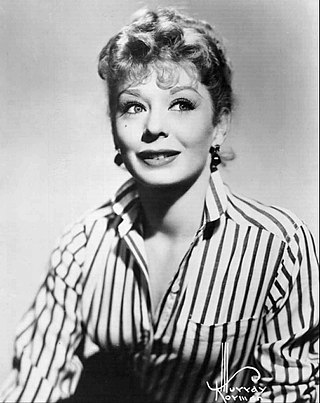
Gwyneth Evelyn "Gwen" Verdon was an American actress and dancer. She won four Tony Awards for her musical comedy performances, and she served as an uncredited choreographer's assistant and specialty dance coach for theater and film. Verdon was a critically acclaimed performer on Broadway in the 1950s, 1960s, and 1970s, having originated many roles in musicals, including Lola in Damn Yankees, the title character in Sweet Charity and Roxie Hart in Chicago.
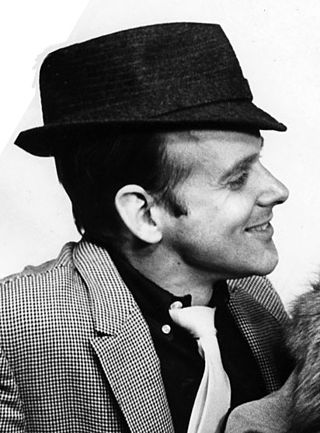
Robert Louis Fosse was an American actor, choreographer, dancer, and film and stage director. He directed and choreographed musical works on stage and screen, including the stage musicals The Pajama Game (1954), Damn Yankees (1955), How to Succeed in Business Without Really Trying (1961), Sweet Charity (1966), Pippin (1972), and Chicago (1975). He directed the films Sweet Charity (1969), Cabaret (1972), Lenny (1975), All That Jazz (1979), and Star 80 (1983).

Sweet Charity is a musical with music by Cy Coleman, lyrics by Dorothy Fields and book by Neil Simon. It was directed and choreographed for Broadway by Bob Fosse starring his wife and muse Gwen Verdon alongside John McMartin. It is based on the screenplay for the 1957 Italian film Nights of Cabiria. However, whereas Federico Fellini's black-and-white film concerns the romantic ups-and-downs of an ever-hopeful prostitute, in the musical the central character is a dancer-for-hire at a Times Square dance hall. The musical premiered on Broadway in 1966, where it was nominated for nine Tony Awards, winning the Tony Award for Best Choreography. The production also ran in the West End as well as having revivals and international productions.
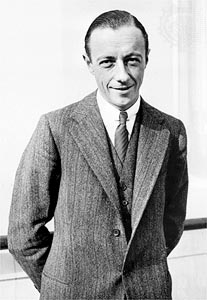
Vincent Millie Youmans was an American Broadway composer and producer.

Stanley Donen was an American film director and choreographer. Donen directed some of the most iconic films of the Golden Age of Cinema. He received the Honorary Academy Award in 1998, and the Career Golden Lion at the Venice Film Festival in 2004. Four of his films have been inducted into the National Film Registry at the Library of Congress.

Deborah Kaye Allen is an American actress, dancer, choreographer, singer-songwriter, director, producer, and a former member of the President's Committee on the Arts and Humanities. She has been nominated 20 times for an Emmy Award, two Tony Awards, and has also won a Golden Globe Award and received a star on the Hollywood Walk of Fame in 1991.

Smile is a musical with music by Marvin Hamlisch and book and lyrics by Howard Ashman. It was originally produced on Broadway in 1986. The musical is based loosely on the 1975 comedy film of the same title, from a screenplay by Jerry Belson.

The Little Prince is a 1974 British-American sci-fi fantasy-musical film with screenplay and lyrics by Alan Jay Lerner, music by Frederick Loewe, arranged and orchestrated by Angela Morley. It was both directed and produced by Stanley Donen and based on the 1943 classic children-adult's novella, The Little Prince, by the writer, poet and aviator Count Antoine de Saint-Exupéry, who disappeared near the end of the Second World War some 15 months after his fable was first published.
"I Got Rhythm" is a piece composed by George Gershwin with lyrics by Ira Gershwin and published in 1930, which became a jazz standard. Its chord progression, known as the "rhythm changes", is the foundation for many other popular jazz tunes such as Charlie Parker's and Dizzy Gillespie's bebop standard "Anthropology ".
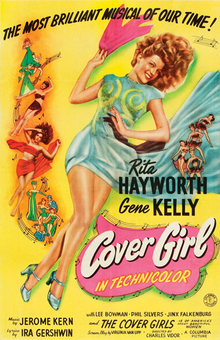
Cover Girl is a 1944 American musical romantic comedy film directed by Charles Vidor, and starring Rita Hayworth and Gene Kelly. The film tells the story of a chorus girl given a chance at stardom when she is offered an opportunity to be a highly paid cover girl. It was one of the most popular musicals of the war years.

Sandahl Bergman is an American actress and dancer. She is best known for her role as Valeria in the film Conan the Barbarian (1982), for which she won a Golden Globe and a Saturn Award.

Joan Hume McCracken was an American dancer and actress who became famous for her role as Sylvie in the original 1943 production of Oklahoma! She also was noted for her performances in the Broadway shows Bloomer Girl (1944), Billion Dollar Baby (1945) and Dance Me a Song (1950), and the films Hollywood Canteen (1945) and Good News (1947).

The Red Shoes is a musical with a book by Marsha Norman, lyrics by Norman and Bob Merrill and music by Jule Styne. Based on Powell and Pressburger's 1948 film, it tells the tale of a young ballerina who performs in an adaptation of the 1845 Hans Christian Andersen story.
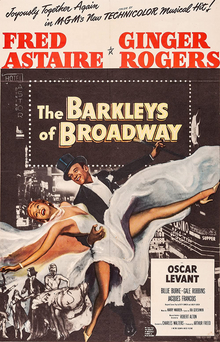
The Barkleys of Broadway is a 1949 American Technicolor musical comedy film from the Arthur Freed unit at Metro-Goldwyn-Mayer that reunited Fred Astaire and Ginger Rogers after ten years apart. Directed by Charles Walters, the screenplay is by Betty Comden, Adolph Green, and Sidney Sheldon, the songs are by Harry Warren (music) and Ira Gershwin (lyrics) with the addition of "They Can't Take That Away from Me" by George and Ira Gershwin, and the choreography was created by Robert Alton and Hermes Pan. Also featured in the cast were Oscar Levant, Billie Burke, Jacques François and Gale Robbins. It is the last film that Astaire and Rogers made together, and their only film together in color. Rogers came in as a last-minute replacement for Judy Garland, whose frequent absences due to a dependence on prescription medication cost her the role.

Tip-Toes is a musical with a book by Guy Bolton and Fred Thompson, lyrics by Ira Gershwin, and music by George Gershwin. It centers on a vaudeville act composed of Tip-Toes, her brother and her uncle, who try to pass her off as an aristocrat to snare a millionaire husband. Farcical complications ensue involving Tip-Toes' temporary amnesia and a marital infidelity subplot.
My Sister Eileen is a 1955 American CinemaScope comedy musical film directed by Richard Quine. It stars Janet Leigh, Betty Garrett, and Jack Lemmon.

Michael Feinstein Sings the Burton Lane Songbook, Vol. 1 is a 1990 album by American vocalist Michael Feinstein, of songs composed by Burton Lane. A second volume, Michael Feinstein Sings the Burton Lane Songbook, Vol. 1 was released in 1992.
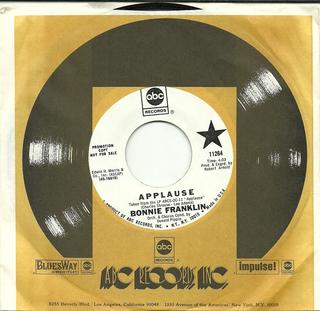
"Applause" is the title song from the 1970 Broadway musical Applause, with music by Charles Strouse and lyrics by Lee Adams, originally performed by Bonnie Franklin, who originated the role of Bonnie in the musical, and recorded as a single with orchestra and chorus conducted by Donald Pippin. The single was released with a B-side featuring the star of the production, Lauren Bacall, making her musical theatre debut, performing "Something Greater" together with Len Cariou. The single's popularity led to Franklin's being invited to perform it on the 24th Tony Awards broadcast on television, where the show gained Best Musical, Bacall Best Leading Actress in a Musical, but Bonnie Franklin missed out on the best supporting actress to Melba Moore.
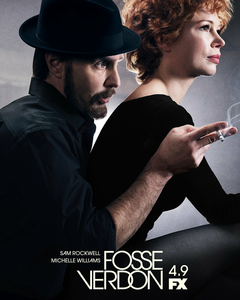
Fosse/Verdon is an American biographical miniseries starring Sam Rockwell as director–choreographer Bob Fosse and Michelle Williams as actress and dancer Gwen Verdon. The series, which tells the story of the couple's troubled personal and professional relationship, is based on the biography Fosse by Sam Wasson. Norbert Leo Butz and Margaret Qualley are also featured as Paddy Chayefsky and Ann Reinking, respectively. It premiered in eight parts on April 9, 2019, on FX.

















